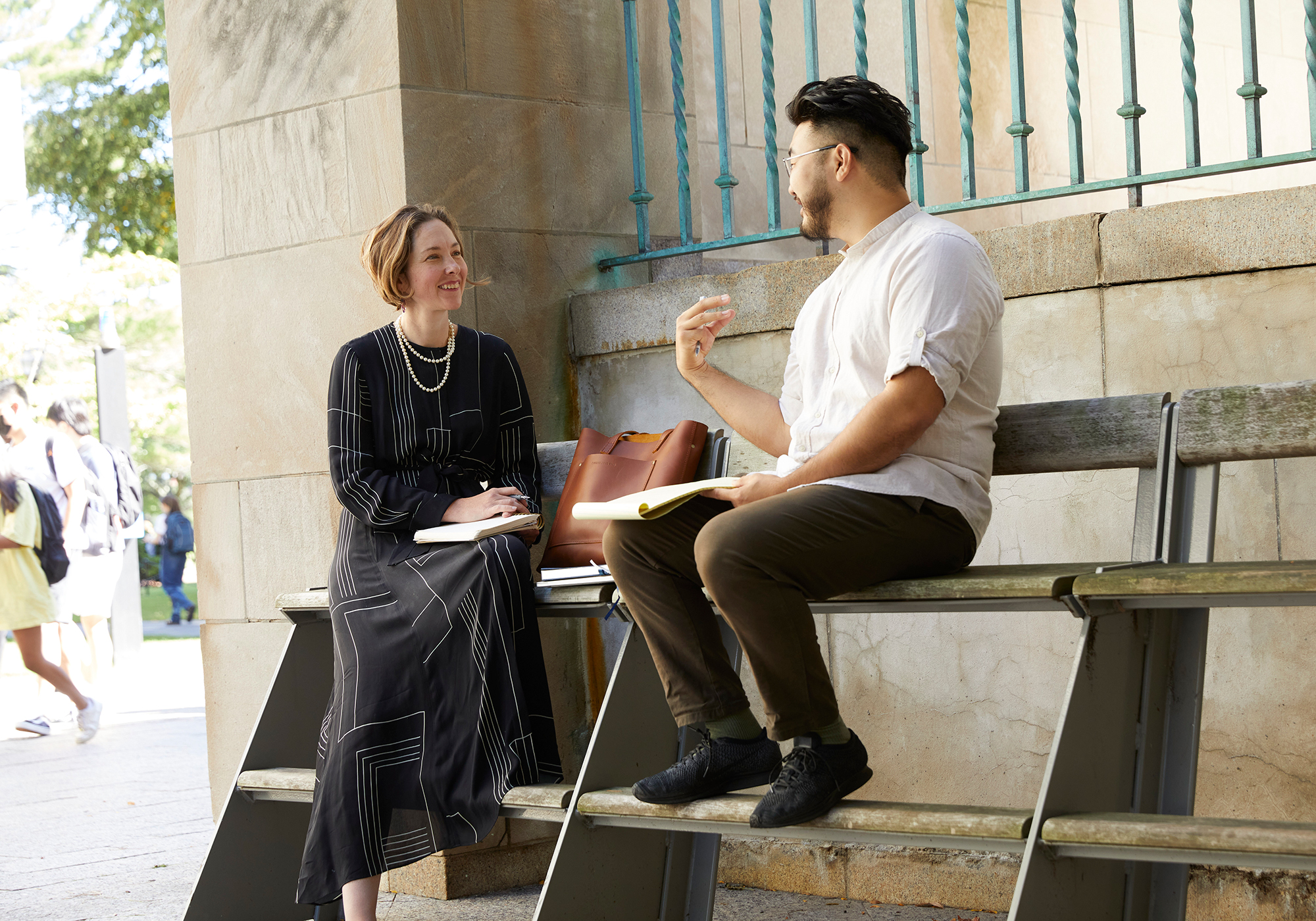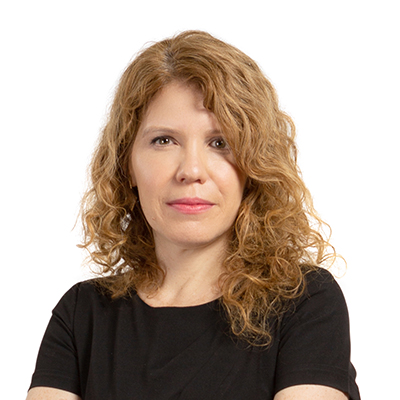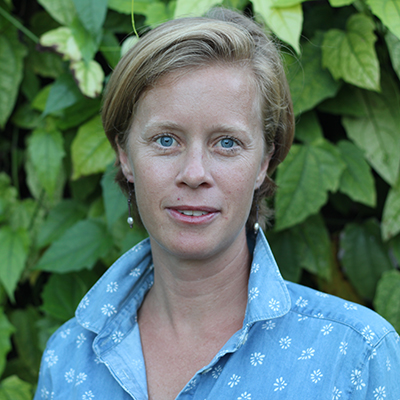Julie Dahlstrom Takes the Helm of Experiential Education Program
Dahlstrom succeeds Professor Karen Pita Loor, who prioritized anti-bias and cross-cultural competency training.

Associate Dean for Experiential Learning Julie Dahlstrom works with James Cho (’22) on a bench outside the law school. | Photo by Kent Dayton
Julie Dahlstrom Takes the Helm of Experiential Education Program
Dahlstrom succeeds Professor Karen Pita Loor, who prioritized anti-bias and cross-cultural competency training.
Highlighting student work and community impact. Building on a deep commitment to equity, justice, and engagement with communities. Strengthening interdisciplinary partnerships across the University. And augmenting robust professional development opportunities for faculty and staff. Those are some of the priorities Boston University School of Law Clinical Associate Professor Julie A. Dahlstrom has in her new role as associate dean for experiential education.
Dahlstrom took over the position on July 1 from Clinical Professor Karen Pita Loor, who had served in the post since 2019 and will return to full-time teaching after a sabbatical this fall.
Boston University’s experiential learning offerings are focused on equity and include clinics and practicums, externships, and simulations. The opportunities range from representing MIT and BU students in their research, advocacy, and creative projects to drafting legislation and advocating for the needs of people living with mental illness, all while confronting a changing legal landscape in which new technologies—including artificial intelligence—are becoming more widespread. At the same time, there is a growing awareness that lawyers must center the needs of the communities they serve—a “moving away from the lawyer-expert vision,” Dahlstrom says.
“It’s a really exciting time to be involved in experiential learning,” she adds. “We’re seeing the practice of law at a point of tremendous change. It’s an opportunity for teachers to think about what it means for lawyers to engage in this important moment in communities.”
Dahlstrom has been deeply involved with the experiential learning program at BU Law. In 2012, she joined the law school to launch the Human Trafficking Clinic, which later became part of the Immigrants’ Rights & Human Trafficking Program. She has also chaired the Public Service Committee, helped develop the public interest concentration, and led efforts to create an annual public interest retreat for students.

In her time as associate dean for experiential education, Loor helped launch the Compliance Policy Clinic, the Access to Justice Clinic, the Health Justice Practicum, and the Mental Health Litigation Practicum.
She also spearheaded BU Law’s efforts to incorporate anti-bias and cross-cultural competency training in the curriculum, including reviewing the syllabus of every clinic, practicum, and externship with its respective faculty member and offering feedback on how to best explore issues surrounding racism and the law and how to make content more inclusive. Dean Angela Onwuachi-Willig was a leader in the effort to push the ABA to require such training for students.
In addition, Loor guided the experiential program through pandemic-related shutdowns and the racial reckoning that followed the murder of George Floyd at the hands of police. Loor led the experiential faculty as they issued a statement condemning Floyd’s murder, the police killings of other people of color, and the aggressive and militarized policing of racial justice protesters. During the pandemic, she also worked with other faculty to make sure students had what they needed to complete their externships or client representation safely in person or remotely under the University’s Learn from Anywhere model.
Floyd’s death in May 2020, Loor says, “made it clear that, despite the fact that we were in the middle of the pandemic, we couldn’t put to the side problems of systemic racism.”
Loor doubled down on efforts to address those issues in the curriculum.
“One of her strong priorities was ensuring that we as a faculty are committed to addressing issues of bias,” Dahlstrom says. “She increased training for faculty around these issues and emphasized the importance of teaching about bias, cross-cultural humility, and racism in the classroom. I’m very excited to build upon her leadership.”
It’s a really exciting time to be involved in experiential learning. We’re seeing the practice of law at a point of tremendous change. It’s an opportunity for teachers to think about what it means for lawyers to engage in this important moment in communities.
Dahlstrom also plans to offer regular discussions and pedagogy workshops for faculty professional development related to antiracism, professional identity formation, and the changing landscape of lawyering. For example, in October, Fordham School of Law Professor Norrinda Brown will offer a workshop for experiential faculty about teaching law aligned with the Black radical imagination, and, in February, Duke University School of Law Professor Anne Gordon will present on how to nurture varied pathways to success for students. Dahlstrom recently launched a brownbag series in which faculty can engage in dialogue about the changing realities of the legal profession and law teaching. In October, they will tackle the intersection of artificial intelligence and experiential education.
“The practice of law is always evolving, and we, as faculty, have to learn to be nimble and respond,” she says.
Another priority for Dahlstrom is connecting students and professors from different departments and schools; in September, Ziba Cranmer from the Rafik B. Hariri Institute for Computing and Computational Science and Engineering spoke to faculty about opportunities for law and technology partnerships. That’s something Dahlstrom has emphasized in her own clinical work: In 2018, two students in the Immigrants’ Rights & Human Trafficking Program worked with students from the Hariri Institute and the Frederick S. Pardee School of Global Studies to develop an app that can help law enforcement personnel identify victims of labor trafficking.
“We’re committed to thinking about lawyering through a more intersectional lens,” she says. “How do we solve complex social and legal challenges in ways that involve the law or maybe even respond to law’s failures? This requires that we think across disciplines and often look beyond the law.”
Dahlstrom also hopes to amplify the voices of students who participate in experiential learning opportunities and the clients they serve, including through a newsletter for the BU Law and broader legal community.
“Part of all of these efforts is not only about creating community but also messaging to the broader community that this is tremendously important work,” she says. “There is a greater and growing recognition of the role of experiential education—connecting theory and practice is the best way to learn. It feels really exciting to be part of that at Boston University, which very much values experiential education as core to our mission.”
